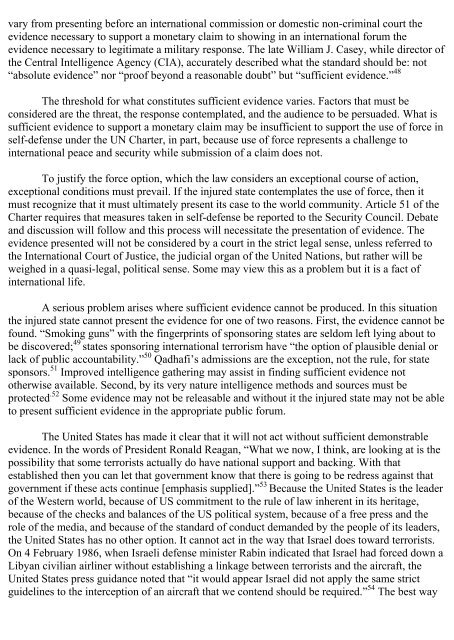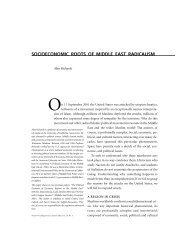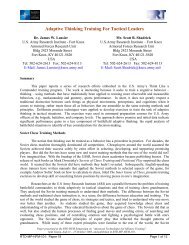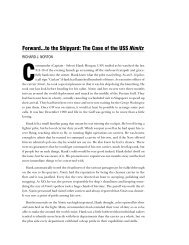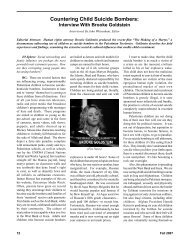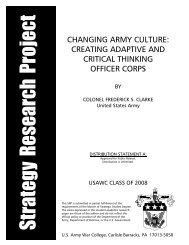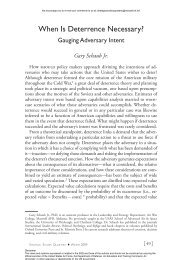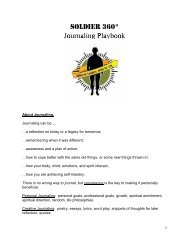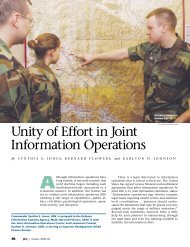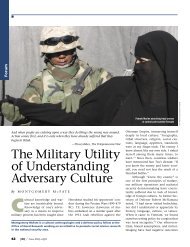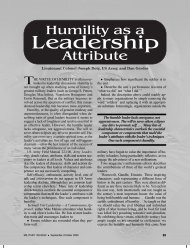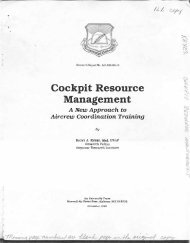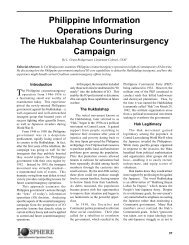Legitimate use of military force against state-sponsored - Air University
Legitimate use of military force against state-sponsored - Air University
Legitimate use of military force against state-sponsored - Air University
Create successful ePaper yourself
Turn your PDF publications into a flip-book with our unique Google optimized e-Paper software.
vary from presenting before an international commission or domestic non-criminal court the<br />
evidence necessary to support a monetary claim to showing in an international forum the<br />
evidence necessary to legitimate a <strong>military</strong> response. The late William J. Casey, while director <strong>of</strong><br />
the Central Intelligence Agency (CIA), accurately described what the standard should be: not<br />
“absolute evidence” nor “pro<strong>of</strong> beyond a reasonable doubt” but “sufficient evidence.” 48<br />
The threshold for what constitutes sufficient evidence varies. Factors that must be<br />
considered are the threat, the response contemplated, and the audience to be persuaded. What is<br />
sufficient evidence to support a monetary claim may be insufficient to support the <strong>use</strong> <strong>of</strong> <strong>force</strong> in<br />
self-defense under the UN Charter, in part, beca<strong>use</strong> <strong>use</strong> <strong>of</strong> <strong>force</strong> represents a challenge to<br />
international peace and security while submission <strong>of</strong> a claim does not.<br />
To justify the <strong>force</strong> option, which the law considers an exceptional course <strong>of</strong> action,<br />
exceptional conditions must prevail. If the injured <strong>state</strong> contemplates the <strong>use</strong> <strong>of</strong> <strong>force</strong>, then it<br />
must recognize that it must ultimately present its case to the world community. Article 51 <strong>of</strong> the<br />
Charter requires that measures taken in self-defense be reported to the Security Council. Debate<br />
and discussion will follow and this process will necessitate the presentation <strong>of</strong> evidence. The<br />
evidence presented will not be considered by a court in the strict legal sense, unless referred to<br />
the International Court <strong>of</strong> Justice, the judicial organ <strong>of</strong> the United Nations, but rather will be<br />
weighed in a quasi-legal, political sense. Some may view this as a problem but it is a fact <strong>of</strong><br />
international life.<br />
A serious problem arises where sufficient evidence cannot be produced. In this situation<br />
the injured <strong>state</strong> cannot present the evidence for one <strong>of</strong> two reasons. First, the evidence cannot be<br />
found. “Smoking guns” with the fingerprints <strong>of</strong> sponsoring <strong>state</strong>s are seldom left lying about to<br />
be discovered; 49 <strong>state</strong>s sponsoring international terrorism have “the option <strong>of</strong> plausible denial or<br />
lack <strong>of</strong> public accountability.” 50 Qadhafi’s admissions are the exception, not the rule, for <strong>state</strong><br />
sponsors. 51 Improved intelligence gathering may assist in finding sufficient evidence not<br />
otherwise available. Second, by its very nature intelligence methods and sources must be<br />
protected .52 Some evidence may not be releasable and without it the injured <strong>state</strong> may not be able<br />
to present sufficient evidence in the appropriate public forum.<br />
The United States has made it clear that it will not act without sufficient demonstrable<br />
evidence. In the words <strong>of</strong> President Ronald Reagan, “What we now, I think, are looking at is the<br />
possibility that some terrorists actually do have national support and backing. With that<br />
established then you can let that government know that there is going to be redress <strong>against</strong> that<br />
government if these acts continue [emphasis supplied].” 53 Beca<strong>use</strong> the United States is the leader<br />
<strong>of</strong> the Western world, beca<strong>use</strong> <strong>of</strong> US commitment to the rule <strong>of</strong> law inherent in its heritage,<br />
beca<strong>use</strong> <strong>of</strong> the checks and balances <strong>of</strong> the US political system, beca<strong>use</strong> <strong>of</strong> a free press and the<br />
role <strong>of</strong> the media, and beca<strong>use</strong> <strong>of</strong> the standard <strong>of</strong> conduct demanded by the people <strong>of</strong> its leaders,<br />
the United States has no other option. It cannot act in the way that Israel does toward terrorists.<br />
On 4 February 1986, when Israeli defense minister Rabin indicated that Israel had <strong>force</strong>d down a<br />
Libyan civilian airliner without establishing a linkage between terrorists and the aircraft, the<br />
United States press guidance noted that “it would appear Israel did not apply the same strict<br />
guidelines to the interception <strong>of</strong> an aircraft that we contend should be required.” 54 The best way


